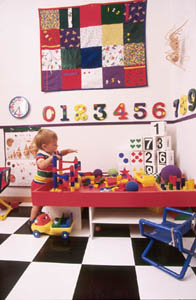| Home | Baby Space | Kid Space | About Ro | Lectures | Books |
|
Room Tip:
Creating
Cardboard Furnishings
Decorating your child's room with cardboard furnishings is a paper caper that involves you and your child if you take the do-it-yourself approach.
cut edges. For safety, cover edges with heavy tape or "upholster" your designs with fabric or wallpaper. Ideas to explore:
Before pressing boxes into duty as furnishings, stuff them with crumpled newspaper. Then cover the outside with self-adhesive paper in solid colors. Now accent the covered boxes with peel-off letters or symbols available through stationery stores. Large Industrial-Strength
Boxes:
While it's unrealistic to decorate your child's entire room with cardboard furnishings, making space for at least one such piece is more than economically wise. Using them in your home is a good way to teach kids the value of recycling. Open up a
child's eyes to new possiblities for living in this world, and chances are
you open their minds, too. -- Ro Logrippo |
| Home | Baby Space | Kid Space | About Ro | Lectures | Books |
Text or images on this site may not be captured and used for electronic publishing or other purposes.
Use of any material requires the copyright holder Ro Logrippo's express written permission.
Living & Learning Environments
39506 N. Daisy Mountain Dr, Ste. 122-180
Anthem, AZ 85086
Phone (USA) 623-551-7696
